A Revolution Fails in Caryl Churchill's Light Shining in Buckinghamshire
New York Theatre Workshop presents a revival of this play about the English Civil War.
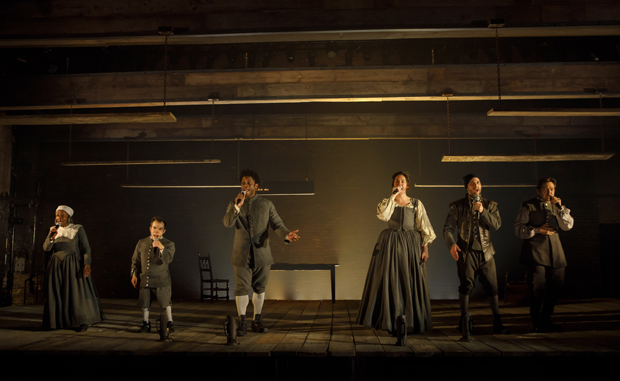
(© Joan Marcus)
Human beings are creatures of habit: Most of us will only tolerate a limited period of instability in pursuit of positive change. Caryl Churchill examines one such revolutionary window in her 1976 play Light Shining in Buckinghamshire, set during the English Civil War of 1642-1651. It features contentious debates about political equality and property distribution, ideas that are still fiercely disputed in 2018. It should be one of the hottest political plays in New York; so why do so many audience members appear to be struggling to stay awake?
It has nothing to do with a top-notch production from a company that knows how to do this material. The most dedicated local champion of Churchill's work, New York Theatre Workshop holds Buckinghamshire in particularly high esteem, having produced its New York debut in 1991. Hadestown director Rachel Chavkin helms this revival, which is an ideal match: Chavkin's company, the TEAM, collaboratively devises smart and politically engaging plays like Mission Drift and RoosevElvis in a manner very similar to Joint Stock, the London company that originally developed Buckinghamshire. If anyone understands how to make this play crackle, it's her.
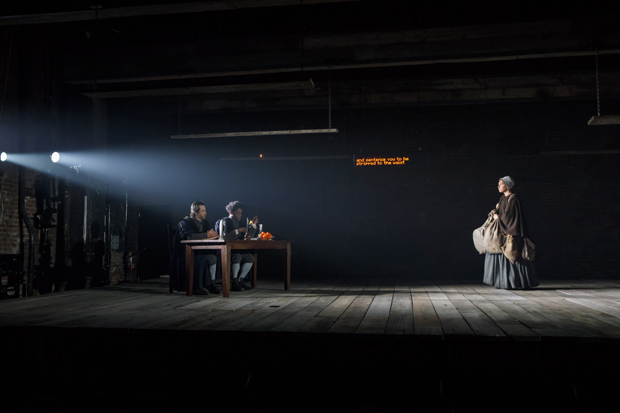
(© Joan Marcus)
And for the first act, it does: That's when we meet characters like Margaret Brotherton (Evelyn Spahr), an impoverished woman who is flogged for begging. There's also Briggs (Gregg Mozgala), a laborer who joins parliament's New Model Army to fight the tyrannical King Charles and advance his station. Neither will be granted the vote following the war should Henry Ireton (Matthew Jeffers) have his way. He believes that only those with a "permanent interest" in the kingdom (read: property owners) should be able to vote for members of parliament.
The most exciting part of the play depicts the Putney Debates between Ireton and the Levellers, a political movement agitating for universal male suffrage. Ireton is sure that allowing the penniless masses to vote will eventually lead to the abolition of private property altogether. Colonel Nathaniel Rich (Rob Campbell) suggests a compromise by which propertyless veterans are given the vote. He predicts, in the most chilling line of the play, that if the poor are thrown this scrap, "they will desire no more liberty."
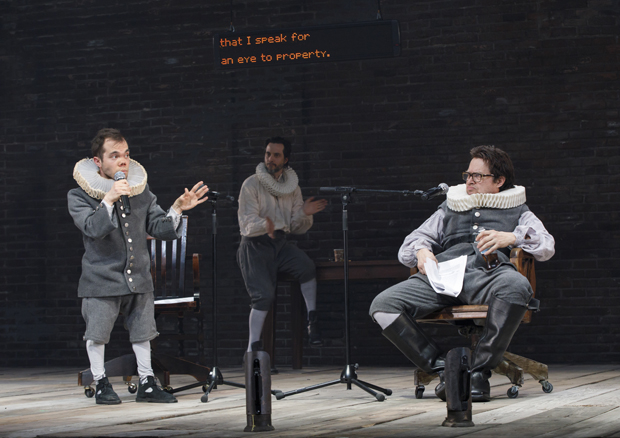
(© Joan Marcus)
The Levelers' proposals are eventually remanded to committee to die a quiet death. Spahr looks directly at the audience in the final moment of the first act, as if to apologize to posterity as the optimism of this revolution fades to military dictatorship under Oliver Cromwell, with the bourgeoisie installed as the new elite. But those of us paying attention are not surprised. From the River Thames to Tahrir Square, revolutions have only ever ended this way.
Chavkin brings Cromwellian order to Churchill's unruly dramatic revolution with her clear and effective staging. She smartly rejects Churchill's idea to have the actors trade roles throughout, a formal rebuke of ownership that also serves as a rebuke of coherence.
It helps that all of the actors give lucid, emotionally stirring performances. This is especially true of Vinie Burrows in a rabble-rousing portrayal of Joan Hoskins, a woman who directly challenges a male preacher in his own church. Mikéah Ernest Jennings plays her disciple, Claxton, with radiant fervor, winning converts in the process. Everyone has a talent for making this antique political language seem fresh and spontaneous, bringing these 17th-century religious fanatics directly into conversation with today.
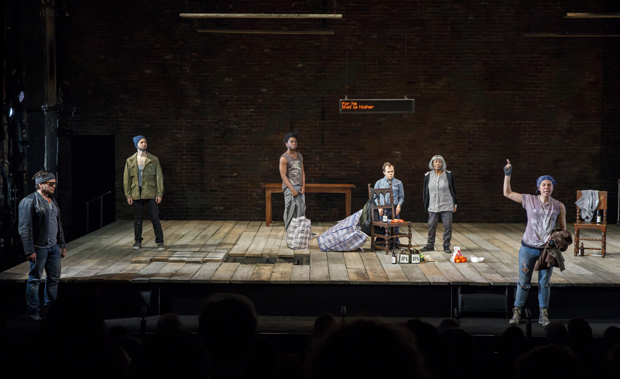
(© Joan Marcus)
Toni-Leslie James's costumes also do that: They are puritan drab in the first act, retaining elements of the 17th century while stealthily morphing into modern dress by the end of the play. Lighting designer Isabella Byrd and sound designer Mikaal Sulaiman deliver jarring, goosebumps-producing cinematic effects. Riccardo Hernández's set is similarly powerful: As we head into the Putney Debates, the low wooden rafters ascend higher, opening a whole new vista of possibilities. It is a glorious sight to behold, but we wonder why the ceiling doesn't close back in during the second act.
That's when the revolution stalls and we are subjected to an extended visit with the Ranters, a fringe religious group that believes that God is found in all things and people. This interminable scene devolves into mawkish group therapy as we completely tune out. Another scene with a preachy butcher railing against our gluttony is meant to be in-yer-face, but comes off as merely ridiculous. After two hours and 40 minutes, we've had enough of these ranty revolutionaries.
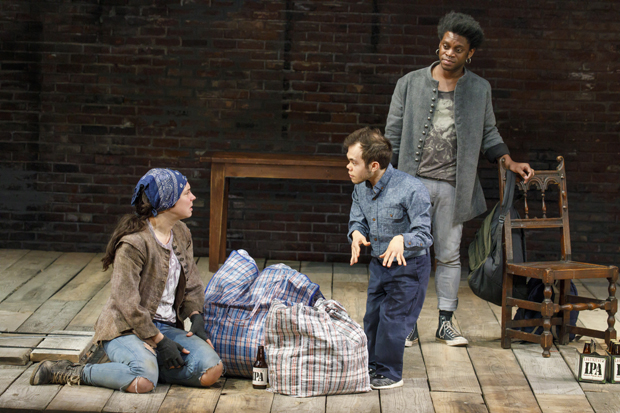
(© Joan Marcus)
Despite their best efforts, Chavkin and company cannot salvage this shaggy early effort by Churchill. Still, moments of revelation hide within its rolls of fat: For instance, the proliferation of print technology and the relative lack of censorship during the English Civil War allowed for the transgressive ideas we've just witnessed to briefly flourish, some lingering to this day. One wonders if historians will look back with similar wonder on this age before the Internet has been fully tamed. The lesson is clear: Make the change you want now, because the window is closing fast and the reactionaries are already inside the house.








